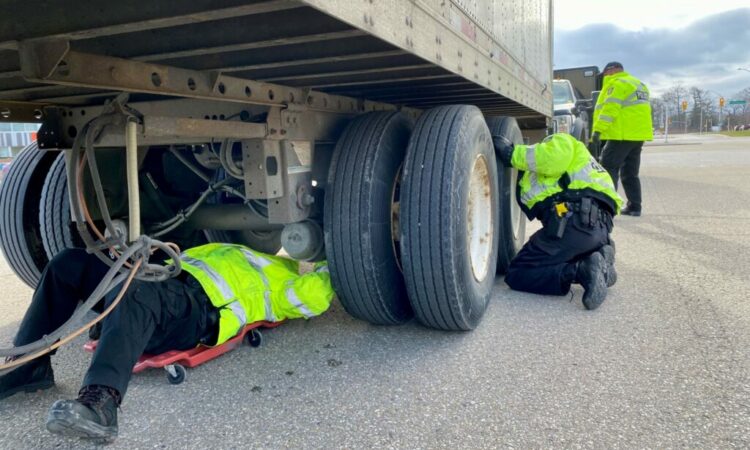There were approximately 9,000 collisions in Ontario involving transport trucks last year
An Ontario trucking advocacy group is calling on Ottawa to tighten the national minimum safety standards for new drivers hoping to get into the profession to improve safety and to reduce the number of collisions.
Police in Ontario report there are approximately 9,000 collisions yearly involving transport trucks on provincial highways and roads.
It’s one of the reasons the trucking industry in the province is getting behind a petition supported by Kitchener Green MP Mike Morrice, with 500 signatures needed for it to be presented in the House of Commons.
Similar calls for regulated training have been initiated in the past, including in the months following the Humbolt bus crash that saw a transport truck driver sentenced to 8 years in prison.
In 2020, the Canadian Council of Motor Transportation Administrators (CCMTA) came up with 16 standards for new drivers. However, only five provinces, Ontario, British Columbia, Alberta, Manitoba and Saskatchewan, have adopted them, according to CCMTA.
“We’re seeing a lot of issues where drivers aren’t prepared for the conditions they’re seeing in different parts of the country,” said Travis McDougall, an Ontario long haul trucker and the co-founder of Truckers for Safer Highways.
“We’re hoping to really get the conversation started in government where officials can make a difference. We don’t feel like it’s being talked about at the right levels and that needs to change,” he said.
The petition wants the federal government to:
- Establish a country-wide mandatory entry level training standard for commercial truck drivers by mandating that the National Safety Code be enforced across Canada through federal legislation and/or regulation.
- Ensure that each province and territory make certain their respective training and licensing frameworks comply with the uniform national standard.
- Mandate that each province and territory be obligated to oversee and enforce training requirements for all commercial truck drivers using their roads.
McDougall also wants the minimum hours of time spent behind the wheel significantly increased.
“About one-third to half of the training required is behind the wheel. The rest is done around the truck or in a theory type setting. We believe 80 per cent of all training should be done behind the wheel,” McDougall said.
Changes require school buy-in
But in-vehicle training is costly, and would only work if hourly mandates were enforced, said Jim Campbell, President of the Continental Transport Safety Association.
He estimates it costs roughly $95 per hour to operate a truck with student drivers likely having to absorb any additional costs.
“The rate to [attend] schools could put it out of the price range of 90 per cent of people,” Campbell said.
He believes it would also be challenging to create standardized training that applies equally across the country, as commercial transport regulations vary from province to province and across all territories, he said.
“Training is a great thing, as long as it’s done properly.”
Industry standards need to improve
Despite provinces needing to abide by the National Safety Code, some in the industry say there is little oversight or enforcement.
The lack of a strong, federally mandated training program which teaches the ins and outs of the trucking industry while adding more hours behind the wheel can lead drivers to develop bad habits and encourages companies to cut corners, said Michael Zelek, the Vice President of Human Resources at Wellington Group in Guelph.
“Some companies are hiring out of desperation instead of doing quality hires. It causes more collisions, more fatalities, more clogged roadways. It’s basically bad for everyone,” Zelek said.

He also believes that the lack of stronger requirements for the profession is doing a disservice to new drivers who want to be competitive in the business, as he says the job requires much more than the bare minimum.
“Truck drivers are very mechanically inclined and very good with geography. There’s a lot going on when you’re behind the wheel. It’s tough, not many people can do it.


